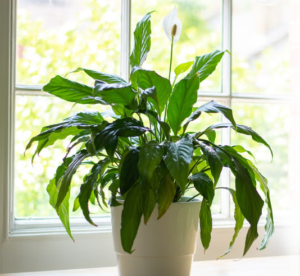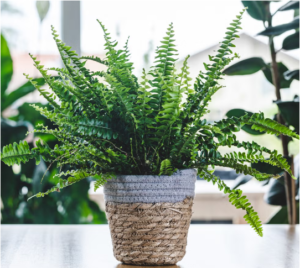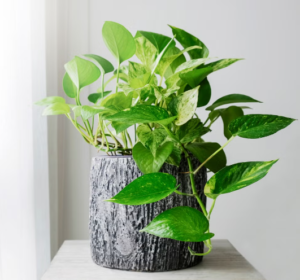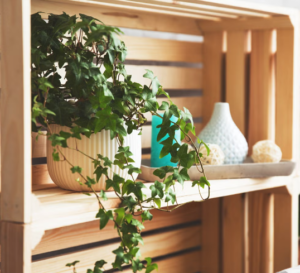“The act of tending to plants can be meditative and provides a moment of mindfulness that helps me reconnect with myself while dealing with the chaos of daily life,” says Ashley Nussman-Berry, founder of the Black Planters Facebook group. The best indoor houseplants aren’t just aesthetically pleasing. Taking care of another living thing, watching it grow and change everyday, can actually help improve your mental health and wellbeing. Many varieties, including snake plants and rubber trees, are even known to be great feng shui plants, which can add positive energy to your space.
 6
6
Succulents and Cacti
Succulents and cacti “thrive on little to no care,” Cromer says. These plants are drought-resistant, meaning they don’t need regular watering; only just when the soil is completely dry. They also come in many shapes and sizes to decorate your space and can help clean the air. Some varieties, including the jade plant, can increase humidity in a room. Aloe vera plants, in particular, also have medicinal properties and can help heal cuts, burns, and other skin ailments.
Since succulents are drought-resistant, they really are the epitome of a stress-free plant that still adds that touch of nature you may crave, especially in urban areas.
“They make us feel closer to nature, when nature may not be right outside our door. Living in an apartment or working in a high rise makes it harder to get out and enjoy nature. Greenery in our homes brings nature in,” says Steinkopf.
 7
7
Peace Lily
The name “peace lily” definitely evokes a sense of calm. These sturdy plants also “flower and are aesthetically pleasing” and may benefit your health over time, explains Trevor Cates, N.D, a naturopathic doctor in Park City, Utah, and author of Clean Skin From Within. A 2022 study published in Applied Sciences suggests that peace lilies have air-cleaning properties and help to remove carbon dioxide and volatile organic compounds (VOCs) from the air.
Peace lilies can live for years and continuously produce broad white flowers that resemble a white peace flag, per materials published by MiracleGro. They’re easy to take care of and don’t need much light, so they’re ideal for shady spaces. Just keep them out of reach from pets and small children, as they can cause vomiting or tongue swelling if they’re ingested.
 8
8
Rubber Plants
Rubber plants — also known as rubber trees or Ficus elastica — make for great indoor houseplants. They’re generally easy to take care of and only need to be watered every week or so, according to materials shared by The Sill. Research shows that rubber plants feature air-purifying properties. Just be sure to keep them firmly away from any pets and young children, as they’re known to be highly toxic when ingested.
 9
9
Ferns
A 2022 study published in Applied Sciences showed that Boston ferns performed best when it comes to air cleaning by naturally VOCs from the air. The plants grow easily and look the best indoors in hanging baskets or on plant stands, which allow their fronds to drape. They need medium bright light and consistently moist soil, so they might require a bit more of your time.
 10
10
Pothos
When you picture a houseplant, the pothos, or Epipremnum pinnatum, is likely what comes to mind. Also known as devil’s ivy or golden pothos, the plants feature vibrant heart-shaped leaves that may be green or marbled green and yellow. They’re easy to grow, needing only indirect sunlight and infrequent watering. Research shows that the plants can lower indoor ozone levels, which can make it easier to breathe and reduce your risk for respiratory ailments, as well as remove VOCs from the air.
Plus, these plants are also aesthetically-pleasing, which can give you a sense of comfort at home. Nussman-Berry appreciates the “lush greenery” of pothos plants, adding that they “can instantly uplift my mood and bring a touch of nature indoors.”
 11
11
English Ivy
English ivy, or Hedera helix, is a versatile plant that’s been shown to lower levels of carbon dioxide, formaldehyde and toxins in the air. They can be grown outside or indoors. As a houseplant, the ivy grows well in hanging baskets or pots, and can be trained to grow along a trellis or shape, according to the Clemson University Cooperative Extension. They grow best in direct sunlight and need to be watered thoroughly once the soil dries out.
 12
12
Herbs
Small potted herbs not only look cute in your kitchen, but they may also inspire you to cook more often and eat healthier. Growing your own basil, parsley or mint is also cheaper than purchasing herbs from the grocery store. Several herbs, like chamomile and lavender, have been shown to reduce anxiety, per Mayo Clinic officials. Herbs also contain vitamins, minerals and antioxidants, which are a boon for your dietary routine.




